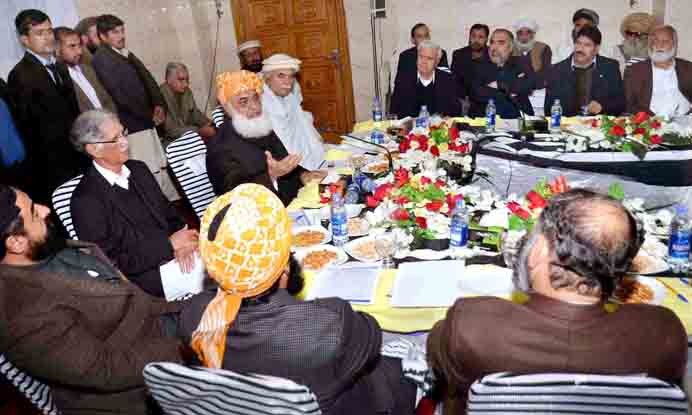
Council of Common Interest is the best forum to address differences on the China-Pakistan Economic Corridor

There has been a great deal of confusion over the actual plan and route of the China-Pakistan Economic Corridor. Forceful rhetoric and discussions in print, electronic and social media about the CPEC are taking place -- parliamentarians from both the treasury and opposition benches are terming it a "game changer" and "window of opportunities." Very few people have full understanding of the 46 billion dollar project that included 77 per cent energy, 10 per cent infrastructure and many other related developmental schemes.
It is a mega project which intends to upgrade Pakistani infrastructure. These projects will span the breadth and width of Pakistan, and will eventually link the Pakistani city of Gwadar Port to China’s northwestern autonomous region of Xinjiang via a vast network of highways and railways. Energy parks, industrial zones and other associated schemes are also part of CPEC.
Major stakeholders in this mega project are raising concerns and demanding their due share from the federal government. Opposition parties from Balochistan and Khyber Pakhtunkhwa are accusing the Centre of keeping the facts of the CPEC within its closed circle. Things were further complicated when Federal Minister Ahsan Iqbal failed to remove the apprehensions of the parliamentary leaders of Khyber Pakhtunkhwa during his recent visit to Peshawar. Rather, he faced some tough questions from the political leadership of the province.
Khyber Pakhtunkhwa Chief Minister Pervez Khattak blamed the ruling PML-N for not taking him on board about the actual plan and the associated schemes of the CPEC. He also blamed the federal government for creating problems regarding the project and depriving his province of its due share in terms of investment, energy and infrastructure. In fact, he accused Prime Minister Nawaz Sharif of breaching his promise of completing the western route on priority basis. The prime minister has also ignored the proposal of upgrading the western route of the CPEC from two to four lanes.
Nawaz Sharif has been accused of protecting the interests of the Punjab with least concern for the less-developed provinces of KP and Balochistan. This image of the premier is largely making inroads among the urban intelligentsia and the rural masses. As one analyst eloquently puts it, "When the Sharifs look at the map of Pakistan, they see Punjab. When they look at Punjab, they see Lahore. When they see Lahore what rivets their attention the most are the roads leading towards Raiwind." The Sharifs should think of a solution that is acceptable and workable for all. They should take all the leadership on board while taking major decisions about the CPEC.
On the other hand, the Centre holds Pervez Khattak responsible for not taking interest in attending the meetings to discuss the preliminaries of the project. Pervez Khattak was invited to visit China along with the PML-N representatives but he reportedly declined.
The PTI is not the only political force in KP that has opposed the federal government’s line of action. These reservations were equally raised by other political parties including QWP, ANP, JI and the provincial intelligentsia. QWP chief Aftab Ahmad Khan Sherpao doubted the Centre’s intentions to complete the western route. He insisted that the western route could prove an alternative strategic route for Pakistan Army and a better chance to eliminate terrorism, besides providing access to Central Asian States.
ANP President Asfandyar Wali Khan urged Prime Minister Nawaz Sharif to come up with a clear policy statement. He made it clear that the people of the province were not against the project. He said that some federal ministers were trying to make the project controversial. "We would not allow a few ministers to make the project controversial and turn the CPEC into a personal business partnership."
JI Amir Sirajul Haq said that the party would resist any change in the China-Pakistan Economic Corridor. He said that Malakand Division was included in the initial map of the CPEC.
Sensing the gravity of the issue and the consequences of blame-game, the office of the prime minister recently issued a statement that industrial zones in Khyber Pakhtunkhwa and Balochistan are being selected. In Khyber Pakhtunkhwa, these zones would be established in Nowshera, Mansehra, Kohat, Bannu, Ghazi, Karak and Dera Ismail Khan. Moreover, Major General (Retd) Dr Zahir Shah, Project Director of CPEC, stressed that Khyber Pakhtunkhwa to get long term benefits from the mega project. He claimed the reservations of KP are justified to the extent of energy projects. Sukki Kinari Hydro Power Project is part of the CPEC.
Instead of accusing each other, suggestions or reservations should be sent to Joint Coordination Committee, Shah was quoted to have said in press. "Punjab will have two power projects whereas Balochistan will have three power plants of 4260 MW as part of CPEC."
After the 18th Constitutional Amendment, the solution to all political problems becomes very easy. The federal government should refer the matter to the Council of Common Interest (CCI). On the other hand, the KP government should take all its parliamentary political leadership into confidence and make a comprehensive and workable strategy. Its reservations would be more effective and practical if referred to the CCI. In fact, the Centre should demonstrate more maturity by addressing the concerns of the provinces on the platform of CCI and other available forums.